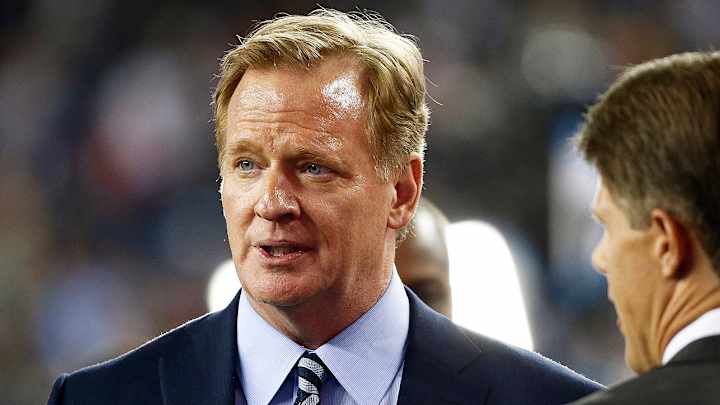Even If the NFL Gets Its Way With Ezekiel Elliott, Roger Goodell Once Again Comes Out the Loser

It is a miracle that Roger Goodell has not suffered any known concussions, considering how often he bangs his head against a wall. Cowboys star Ezekiel Elliott won a temporary restraining order, overturning (at least for now) his six-game suspension for domestic violence, and what’s amazing is the reason Elliott won: the NFL’s system of player discipline is grossly unfair and gives the commissioner too much power … and Goodell still violated it!
Kia Roberts, the league’s Director of Investigations, had serious reservations about disciplining Elliott for abusing his ex-girlfriend. The NFL Players Association contends that the NFL withheld this information from the union, Elliott, and “possibly Commissioner Goodell.”
Yes: Possibly Commissioner Goodell. Of course, you can guess that Goodell knew how Roberts felt. But the system is so rigged in the commissioner’s favor that the NFLPA couldn’t even figure out what Goodell knew.
Goodell may ultimately win this war, as he did with Tom Brady, but it will come at a severe cost, as it did with Brady. The Elliott ruling just reinforces the public perception of Goodell and his scattershot justice system. He always looks like he would give prison time for a parking ticket, then forget to lock the cell.
Elliott is nobody’s martyr, and this ruling does not exonerate him. The fourth sentence in the temporary restraining order is, “The question of whether there was credible evidence of domestic abuse is not before the Court.” But people won’t read the ruling. They will just see another Goodell failure.
What the Ezekiel Elliott Decision Means for Him, the NFL and Other Players
Goodell bungled Spygate. He bungled Deflategate. He bungled the Ray Rice investigation twice – first when he only suspended Rice for two games, and then again after the video of Rice’s punch surfaced and Goodell pretended he didn’t know what happened. He overreached so far in the Saints’ bounty scandal that his predecessor, Paul Tagliabue, vacated the player suspensions. (Tagliabue arbitrated the Saints’ appeal.) And now Goodell has bungled the Elliott case.
That’s a lot of bungling. And it makes you wonder: Why?
Why does Goodell insist on being in charge of player discipline when it has been such a public-relations nightmare for him? And why does he keep botching it?
This system is not working for anybody. The players hate it. Owners go nuts when their player is involved. And Goodell, who is really good at many aspects of his job, looks foolish on a regular basis.
So: Why? You have to look at Goodell’s relationship with the union to really understand. Relationships between management and unions are tense across industries. But the NFL-NFLPA relationship is toxic, to the point where it is truly hard to find any topic on which the league and the union agree.
There is no trust there. There is no recognition that they are partners, and nobody saying, “I see your point.” So small issues become huge ones, and spats that should be resolved with one meeting wind up in court.
After the Elliott ruling, the NFLPA issued a statement ripping the league office for its “lack of integrity,” a highly Tweetable phrase that will please the legions who can’t stand Goodell. But the union statement also lobbed this complaint: “NFL owners have refused to collectively bargain a fair and transparent process that exists in other sports.”
Cowboys’ Ezekiel Elliott Granted Injunction, Court Puts Six-Game Suspension On Hold
That is disingenuous. It’s called “collective bargaining” for a reason. Nobody forced the union to sign the last labor deal. Complaining that owners “refused to collectively bargain” a better process is like complaining about the prenuptial agreement you signed. If it was that bad, why did you sign it?
This is a clever trick by NFLPA leader DeMaurice Smith to unify his members. His message: It’s Us Against Them, and They are nasty bullies, so We have to stick together behind Me. The truth is that player discipline has not been a negotiating priority for Smith, and for a logical reason: it only affects a small percentage of the membership.
A complicating factor is that the current labor deal lasts 10 years, which is unusually long. That is good for fans, because there is no chance of games being canceled, and it has benefits for owners (cost certainty) and players (job certainty). But that 10-year term also means this system will not change any time soon. Goodell is not stupid. He knows that disciplinary power is a chip he can use in the next negotiation if it really bothers players that much. He will only exchange it for concessions from the union. He is not just going to give up that chip before those negotiations begin.
We will find out, in three years, how much the union really cares about this stuff. In the meantime, Goodell should look around. He is not the only commissioner who deals with these problems, and I can assure you: whatever Rob Manfred decides to do about the Red Sox stealing the Yankees signs, the backlash will not be as severe as it was for Deflategate. NBA players bristle at various aspects of their collective bargaining agreement, but I don’t think many of them would describe Adam Silver the way NFL players talk about Goodell.
Goodell has lost his credibility with a lot of fans, and worse, with players. It is at the point where he can’t win: suspensions and non-suspensions are both viewed suspiciously. Everybody would be better off if Goodell conceded some of his disciplinary power. People stopped trusting him with it a long time ago.
